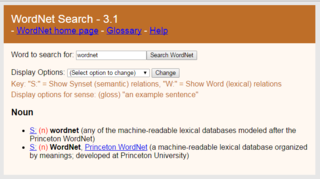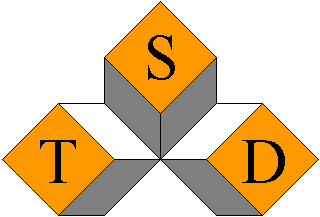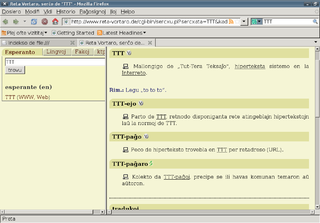
WordNet is a lexical database of semantic relations between words that links words into semantic relations including synonyms, hyponyms, and meronyms. The synonyms are grouped into synsets with short definitions and usage examples. It can thus be seen as a combination and extension of a dictionary and thesaurus. While it is accessible to human users via a web browser, its primary use is in automatic text analysis and artificial intelligence applications. It was first created in the English language and the English WordNet database and software tools have been released under a BSD style license and are freely available for download from that WordNet website. Until about 2024 the English WordNet could be used as an online dictionary/lexical database, and references with links to single words could be made, but thereafter one have to download the database to use it. There are now WordNets in more than 200 languages.

Wiktionary is a multilingual, web-based project to create a free content dictionary of terms in all natural languages and in a number of artificial languages. These entries may contain definitions, images for illustration, pronunciations, etymologies, inflections, usage examples, quotations, related terms, and translations of terms into other languages, among other features. It is collaboratively edited via a wiki. Its name is a portmanteau of the words wiki and dictionary. It is available in 195 languages and in Simple English. Like its sister project Wikipedia, Wiktionary is run by the Wikimedia Foundation, and is written collaboratively by volunteers, dubbed "Wiktionarians". Its wiki software, MediaWiki, allows almost anyone with access to the website to create and edit entries.

LEO is an Internet-based electronic dictionary and translation dictionary initiated by the computer science department of the Technical University of Munich in Germany. After a spin-out, the dictionaries have been run since 3 April 2006 by the limited liability company Leo GmbH, formed by the members of the original Leo team, and are partially funded by commercial advertising on the website. Its dictionaries can be consulted free online from any web browser or from LEO's Lion downloadable user interface (GUI), which is free since version 3.0, to private users only, and no longer sold as shareware. Corporate users and research institutions are however required to purchase a license.

The Deutsches Wörterbuch, abbreviated DWB, is the largest and most comprehensive dictionary of the German language in existence. Encompassing modern High German vocabulary in use since 1450, it also includes loanwords adopted from other languages into German. Entries cover the etymology, meanings, attested forms, synonyms, usage peculiarities, and regional differences of words found throughout the German speaking world. The dictionary's historical linguistics approach, illuminated by examples from primary source documents, makes it to German what the Oxford English Dictionary is to English. The first completed DWB lists over 330,000 headwords in 67,000 print columns spanning 32 volumes.

Scouse is a type of stew typically made from chunks of meat with potatoes, carrots, and onion. It is particularly associated with the port of Liverpool; hence, the inhabitants of that city are often referred to as "scousers". The word "scouse" comes from lobscouse, a stew commonly eaten by sailors throughout northern Europe in the past, and surviving in different forms there today.

Dictionary is an application developed by Apple Inc. as a part of macOS. The application provides definitions and synonyms from various dictionaries, Wikipedia articles and a glossary of Apple-related terms.

A bilingual dictionary or translation dictionary is a specialized dictionary used to translate words or phrases from one language to another. Bilingual dictionaries can be unidirectional, meaning that they list the meanings of words of one language in another, or can be bidirectional, allowing translation to and from both languages. Bidirectional bilingual dictionaries usually consist of two sections, each listing words and phrases of one language along with their translation. In addition to the translation, a bilingual dictionary usually indicates the part of speech, gender, verb type, declension model and other grammatical clues to help a non-native speaker use the word. Other features sometimes present in bilingual dictionaries are lists of phrases, usage and style guides, verb tables, maps and grammar references. In contrast to the bilingual dictionary, a monolingual dictionary defines words and phrases instead of translating them.

Google Translate is a multilingual neural machine translation service developed by Google to translate text, documents and websites from one language into another. It offers a website interface, a mobile app for Android and iOS, as well as an API that helps developers build browser extensions and software applications. As of January 2025, Google Translate supports 249 languages and language varieties at various levels. It served over 200 million people daily in May 2013, and over 500 million total users as of April 2016, with more than 100 billion words translated daily.
William Whitaker's Words is a computer program that parses the inflection or conjugation of a given Latin word entered by the user, and also translates the root into English. Conversely, given a basic English word, the program can output a Latin translation, generally with several possible Latin alternatives, although the database of translatable English words is not comprehensive. The software, written in Ada, is free for download but can be used online through several different hosts as well.
Sesli Sozluk is a multilingual online dictionary, primarily English to Turkish and Turkish to English. German, Italian, French, Spanish, Greek, Russian, Danish, Dutch, Polish and Portuguese translations are also provided. The online dictionary also can be used in PDAs, SmartPhones, any phone supporting a web browser.

Google Dictionary is an online dictionary service of Google that can be accessed with the "define" operator and other similar phrases in Google Search. It is also available in Google Translate and as a Google Chrome extension. The dictionary content is licensed from Oxford University Press's Oxford Languages. It is available in different languages, such as English, Spanish and French. The service also contains pronunciation audio, Google Translate, a word origin chart, Ngram Viewer, and word games, among other features for the English-language version. Originally available as a standalone service, it was integrated into Google Search, with the separate service discontinued in August 2011.

Microsoft Translator or Bing Translator is a multilingual machine translation cloud service provided by Microsoft. Microsoft Translator is a part of Microsoft Cognitive Services and integrated across multiple consumer, developer, and enterprise products, including Bing, Microsoft Office, SharePoint, Microsoft Edge, Microsoft Lync, Yammer, Skype Translator, Visual Studio, and Microsoft Translator apps for Windows, Windows Phone, iPhone and Apple Watch, and Android phone and Android Wear.
Ultralingua is a single-click and drag-and-drop multilingual translation dictionary, thesaurus, and language reference utility. The full suite of Ultralingua language tools is available free online without the need for download and installation. As well as its online products, the developer offers premium downloadable language software with extended features and content for Macintosh and Windows computer platforms, smartphones, and other hand held devices.
Adaptxt is a predictive text application for mobile phones, developed by KeyPoint Technologies, a UK-based software company. The application is designed to improve text entry on mobile devices by making it faster and error-free. It achieves this by predicting the next word as well as the word being typed, continuously adapting to the user's writing style and vocabulary.

Tatoeba is a free collection of example sentences with translations geared towards foreign language learners. It is available in more than 400 languages. Its name comes from the Japanese phrase tatoeba (例えば), meaning 'for example'. It is written and maintained by a community of volunteers through a model of open collaboration. Individual contributors are known as "Tatoebans". It is run by Association Tatoeba, a French non-profit organization funded through donations.
JMdict is a large machine-readable multilingual Japanese dictionary. As of March 2023, it contains Japanese–English translations for around 199,000 entries, representing 282,000 unique headword-reading combinations. The dictionary files are free to use with attribution and have been widely adopted on the Internet and are used in many computer and smartphone applications. The project is considered a standard Japanese–English reference on the Internet and is used by the Unihan Database and several other Japanese–English projects.

Text, Speech and Dialogue (TSD) is an annual conference involving topics on natural language processing and computational linguistics. The meeting is held every September alternating in Brno and Plzeň, Czech Republic.

Reta Vortaro is a general-purpose multilingual Esperanto dictionary for the Internet. Each of the dictionary's headwords is defined in Esperanto, along with additional information, such as example sentences, to help distinguish the subtle shades of meaning that each particular word form may have.
OntoLex is the short name of a vocabulary for lexical resources in the web of data (OntoLex-Lemon) and the short name of the W3C community group that created it.

SpanishDict is a Spanish-American English reference, learning website, and mobile application. The website and mobile application feature a Spanish-American English dictionary and translator, verb conjugation tables, pronunciation videos, and language lessons. SpanishDict is managed by Curiosity Media.














